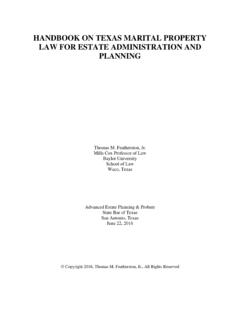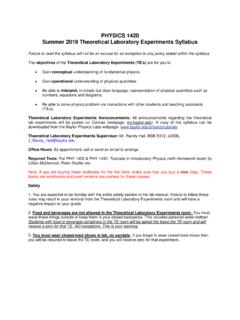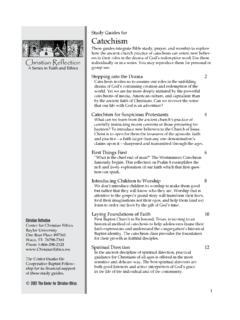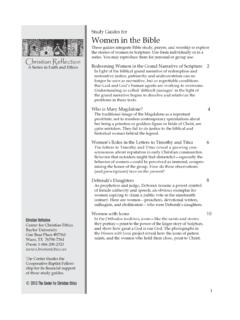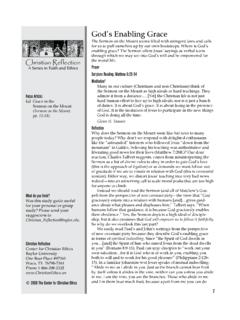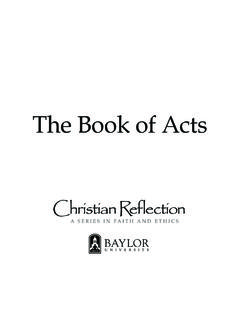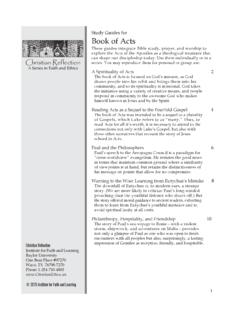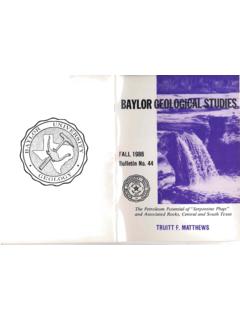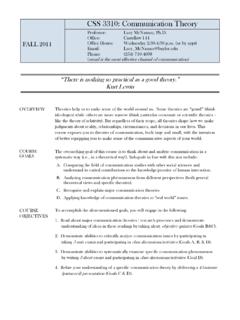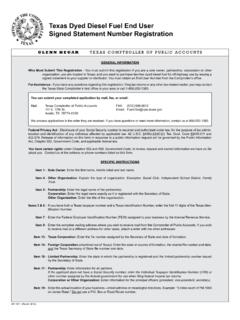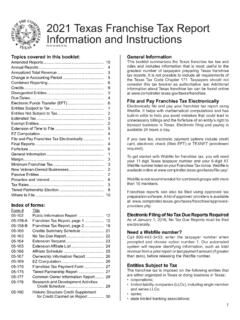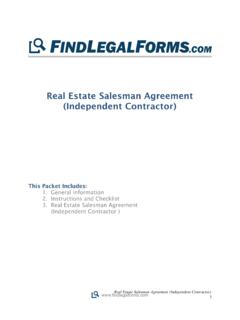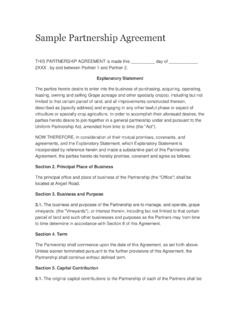Transcription of RECENT CASES INVOLVING LIMITED LIABILITY COMPANIES …
1 RECENT CASES INVOLVINGLIMITED LIABILITY COMPANIES ANDLIMITED LIABILITY PARTNERSHIPSE lizabeth S. MillerProfessor of LawBaylor UniversitySchool of LawWaco, Texas 2011 Elizabeth S. Miller, All Rights ReservedTable of LIABILITY or Capacity to Sue or Be Se LIABILITY of LIABILITY of to Se of of or Failure to Form LIABILITY of LLC Members and Managers/Personal LIABILITY Under Agency orOther Veil of Member, Manager, or of Property/Interest of Duties of Members and and Access to of Operating of Interest/Buy-Out of Contributions and Contribution , Expulsion.
2 Or Termination of and Winding or Administrative LLC Failure to Qualify to Do LLC Governing of s s to Financial Estate Transfer and Employment of Trade Member s Employment Tax LIABILITY /Validity of Check-the-Box Activity LIABILITY , Client CASES INVOLVING LIMITED LIABILITY COMPANIES AND LIMITED LIABILITY PARTNERSHIPSBy Elizabeth S. MillerJanuary, 2011 This paper includes summaries of CASES that have appeared since the paper prepared for the 2010 LIMITED LIABILITY Entities program.
3 The volume of case law overtook the author s ability to prepare acomprehensive survey for the past twelve months, and the author is endeavoring to catch up on the backlog of CASES in her possession. Past surveys of LLP and LLC CASES may be accessed at the author s facultyprofile page at the Baylor Law School web site at Additional surveys will beposted on the site LIABILITY JurisdictionLee v. Brown, No. 3:08-CV-01206 CSH, 2009 WL 3157542 (D. Conn. Sept. 25, 2009) (stating thatrule that partnership has citizenship of each of its partners for purposes of diversity jurisdiction applies toLLPs).
4 Or Capacity to Sue or Be SuedRaskov v. Stapke & Harris, No. B215351, 2010 WL 522780 (Cal. App. 2 Dist. Feb. 16, 2010)(rejecting attempt to analogize State Bar s termination of LLP s certificate of registration to suspendedcorporation for purposes of determining firm s standing to defend itself in declaratory judgment actionbecause rule in corporate context is statutory rule LIMITED to corporations). Se RepresentationJ & J Sports Productions, Inc. v. Sunsets on Sand, LLP, No. 10-cv-12-wmc, 2010 WL 1740803( Wis.)
5 April 29, 2010) (holding LLP could not appear pro se through partner who was not licensedattorney, and noting that purpose of engaging in business as LLP is to limit recovery to entity s assets ratherthan assets of partners and requirement that LLP be represented by counsel did not preclude partner fromcontinuing to defend herself individually). LIABILITY of PartnersHenry v. Masson, __ __, 2010 WL 5395640 (Tex. App. 2010). Henry and Masson werepartners in an orthopedic surgery practice. They formed their practice as an LLP in 2001, and personaldisputes led to litigation in 2003.
6 During a hearing in the case, they agreed in principle to wind up the LLPand sever all ties between them. Additional disputes and issues arose, and another suit was filed. In anattempt to resolve all their differences, they executed a settlement agreement . Litigation ensued over allegedbreaches of the settlement agreement . Among the issues addressed in this appeal was a claim by Masson thatthe trial court erred in ordering Henry and Masson to make capital contributions to the partnership to allowthe partnership to pay out funds it had taken in that actually belonged to two new entities formed by theparties.
7 Masson based his argument on the fact that the partnership was an LLP and the provision of the1 Texas Revised partnership Act providing that partners in an LLP are protected from individual LIABILITY forthe debts and obligations of the partnership incurred while the partnership is an LLP. The court stated thatneither the partnership agreement nor the statute prevented the trial court from ordering contributions to thepartnership during winding up. According to the court, the payments the trial court ordered Henry andMasson to make were capital contributions to discharge debts of the partnership during winding up, not anadjudication of individual LIABILITY for the debts or obligations as contemplated by the statute.
8 The courtrelied upon the partnership agreement , which provided that if no partner agreed to lend funds needed todischarge the partnership s debts, obligations, and liabilities as they came due, each partner was required totimely contribute the partner s proportionate share of funds needed. Masson argued that this provision wasnot intended to apply in the winding up process and that reference elsewhere in the partnership agreementto payment of the partnership s debts upon dissolution to the extent funds are available evidenced thepartners intent that they would not be required to make additional capital contributions during the windingup.
9 The court stated that the phrase relied upon by Masson appeared in a section referring to steps to betaken after the sale of partnership property, and the funds mentioned are funds received from the sale ofpartnership property. The court did not interpret the agreement to mean that sale of partnership property wasthe only source of funds to pay debts. The court also rejected Masson s argument that the reference in thecapital contribution provision to payment of debts as they become due and payable was evidence that theparties did not intend to require capital contributions during winding up.
10 The court stated that due andpayable simply modified the type of debt to be paid and did not limit the provision to operational statusof the & J Sports Productions, Inc. v. Sunsets on Sand, LLP, No. 10-cv-12-wmc, 2010 WL 1740803( Wis. April 29, 2010) (noting that purpose of engaging in business as LLP is to limit recovery toentity s assets rather than assets of partners and requirement that LLP be represented by counsel did notpreclude partner from continuing to defend herself individually).Edlinger v.
